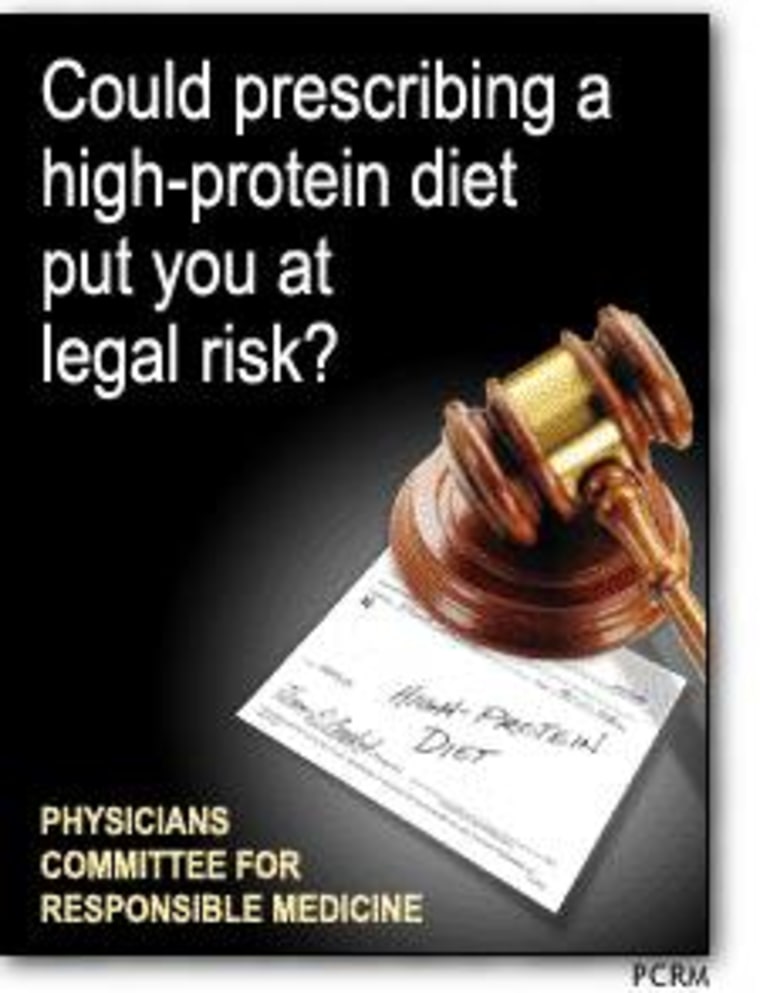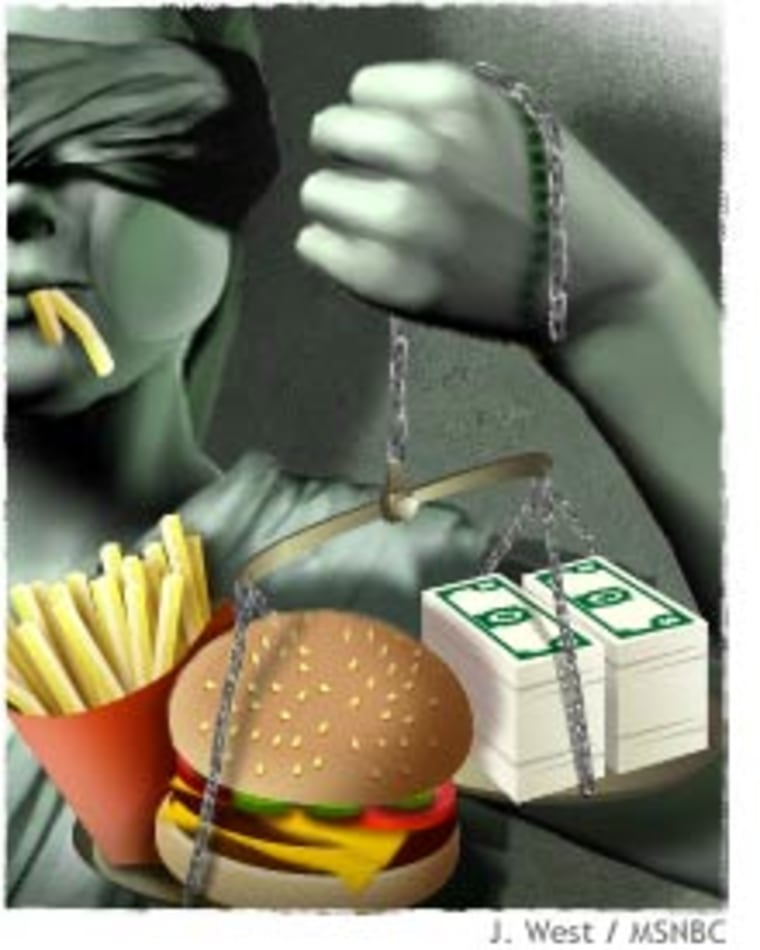We’re a rotund nation. Just walk down the street — six out of every 10 of us are, well, supersized. We’re also a rather litigious bunch, home of the multimillion dollar spilled-coffee lawsuit, to name one. So it was just a matter of time before some legal mind asked the question: Who’s to blame for the fattening of America?
A movement is brewing to hold the companies that peddle us fatty foods accountable for making us fat — just as the tobacco industry has had to pay for making some of us sick.
Last week, Caesar Barber, a 56-year-old maintenance worker from the Bronx, filed a lawsuit against four major fast food chains claiming their fatty fare led to his obesity and health problems, which include two heart attacks and diabetes. His attorney, Samuel Hirsch, estimates millions of Americans could be included in the claim, which charges deceptive marketing practices encourage obesity.
Many Americans balk at the idea of blaming McDonald’s for our own lack of self-control. “It’s like a shopaholic suing the mall for advertising its sales,” said businesswoman Jenny Klein as she scooped up her family’s order from a Wendy’s in Redmond, Wash., which she was quick to point out was an occasional splurge in their ordinarily well-balanced diets.
Nutrition and weight loss experts call it a vast oversimplification to blame a specific food for causing obesity, which is now the second leading cause of preventable death in the United States.
“I’m the first line of this — I see people battling weight every day, but I don’t think you can blame the fast food industry,” said Dr. Robert Kushner, a weight-loss specialist and medical director of the Wellness Institute at Northwestern Memorial Hospital in Chicago.
The trade group that represents fast food restaurants, the National Restaurant Association, scoffs at the idea that purveyors of fattening food are responsible for America’s weight problem.
“This sort of action gives frivolous a bad name,” Steven Anderson, president of association, said in a statement. “Restaurants have a wide variety of choices on their menus, and people make the choice to eat what they want and when they want every day. This is all about personal responsibility and moderation.”
MORE LAWSUITS ON THE WAY
But this case may just be the first of many. Attorney Richard Daynard, head of the Tobacco Products Liability Project at Northeastern University School of Law in Boston, is turning his attentions to “Big Food.” He’s planning a strategy session in the fall for lawyers and public health experts to decide on effective strategies to hold food corporations accountable for the public health costs of their fattening fare.
“Obviously no one is saying the fast food industry is entirely responsible for the obesity epidemic, but they bear a significant piece of the blame,” Daynard said. “The idea is to find out really what conduct on their part has contributed to obesity, such as misrepresenting the healthiness of the foods they sell.”
Barber, who is 5-foot-10-inches and 272 pounds, said he started eating fast food over 30 years ago because it was cheap and he didn’t know how to cook. But, he said, he didn’t know it was bad for his health until his doctor told him so after he had two heart attacks.
“It was 100 percent beef and that to me said it was good,” Barber told MSNBC. “I never knew about the saturated fat, the sodium content, the sugar content, none of that.”
In addition to seeking damages from McDonald’s, Wendy’s, Kentucky Fried Chicken and Burger King, Barber’s lawsuit seeks to have the companies label individual products with their fat, salt and calorie contents and alert consumers to their consequences with a cigarette-style warning label.
Nutritional information usually appears on the front counter of fast food restaurants and contains the same information as labels you would see on packaged foods, but Hirsch, Barber’s attorney, claims “you gotta be a nutrition scientist or a rocket scientist to figure them out.”
Though some people find it hard to believe that anyone would not know that fried, fat-drenched food is not healthy, Daynard isn’t surprised at all by Barber’s nutritional naïveté.
“McDonalds’ serves millions of customers a day and a substantial number don’t know the food isn’t good for them. I used to get the filet of fish thinking I was taking steps to do what’s reasonable, but actually it has more fat [than the hamburgers]. Their meals are way over the daily allotment of calories, how would you know that?” Daynard said.
Dr. Neal Barnard, president of the Physician’s Committee for Responsible Medicine — an advocacy group that has a beef with beef — applauds the Barber lawsuit.
“There is no question we have to take responsibility for our activities but it’s harder when people aren’t entirely clear what their risks are. There are clear-cut risks of tobacco, but the risks of going into a fast food restaurant are unclear,” Barnard said.

So he argues people who give faulty nutrition information should be liable, whether it’s food industry advertisements that suggest beef is as healthy as chicken or doctors who prescribe the Atkin’s diet — the controversial meat-heavy, low-carb weight-loss regimen — to their patients.
In fact, PCRM is launching an ad campaign next week in medical journals warning doctors they could be liable for any health problems resulting from the high-protein diet, such as diabetes or kidney stones.
“I know we’re playing hardball,” Barnard said. “The tactic is to try to get purveyors of bad diets to back off and provide healthier diets.”
TAKING ON BIG FOOD
So is fast food the next Big Tobacco? Daynard predicts it won’t come to that. “We hope to see fewer lawsuits because the industry may be more willing to change. Because unlike tobacco, they can make money selling food in a completely ethical manner. Maybe this kind of attention to how they sell products and what marketing methods they are using will urge them to change,” he said.
Lola O’Rourke, a Seattle-based spokesperson for the American Dietetic Association, however, doesn’t expect the food industry to protect us from ourselves. “Fast food and other industries have their own agendas and it’s up to us to seek out information on good nutrition.”
After all, chowing french fries is not the same thing as smoking a cigarette. While there’s no moderate amount of smoking that is healthy, eating some fat as part of a well-balanced diet is perfectly fine.
“There are some better choices at fast food restaurants,” O’Rourke added, noting the increasing popularity of salads and baked potato bars. “So you can include some fast food for convenience and economics — all foods can fit into a healthful diet.”
But she won’t offer a recommendation for how many times a week it’s acceptable to eat fast food fare: “It’s impossible to say how much is OK, it depends on how much of other things people are eating.”
“Anyway, if there were no fast food available, there would be plenty of ways for people to take in too many calories,” she said.
So if fast food conglomerates aren’t to blame for plumping us up, who is?
Blame is a common theme in the war on fat, said Kushner, but usually it’s a matter of overweight people blaming themselves. He said blame shouldn’t enter into this battle — “there’s no culprit or victim in this situation. It’s silly to blame yourself or four establishments.”
“Getting overweight is a natural consequence of our society — there’s too much food around and you don’t have to move a lot. You might as well sue the guy who invented the computer or e-mail because they have caused us to get less physical activity.”
